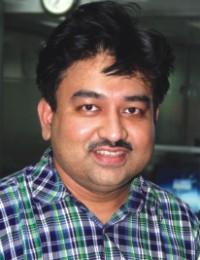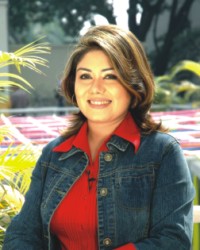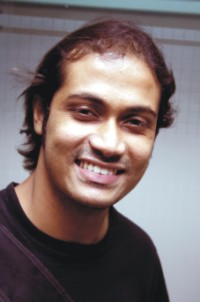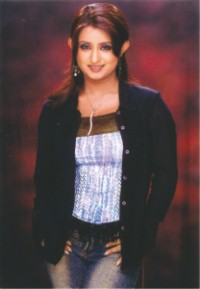|
Entertainmen
Big Stars of the Small Screen
Star Weekend Magazine talks to four hottest hosts who have brought beauty and brilliance to the local television scene
Ahmede Hussain
 |
Abdur Nur Tushar |
Abdur Nur Tushar, the country's leading television programme host, entered the world of television 17 years ago, in 1989. "It all has started with debating," Tushar recalls; that year while studying at Dhaka Medical College, he participated in the National Debate on state-run Bangladesh Television (Btv). After the fall of Ershad he had also participated in the SAARC Debate, where his superb performance as a debater got him a phone call from the Btv requesting him to present an educational programme called Shikkha-Dikkha; the programme, however, did not outlive a few pilot-broadcasts due to internal feud among its planners.
But Tushar's love affair with the camera continued; and at the end of 1992, Bangladesh Open University (BOU) asked him to participate in a quiz programme produced by Faridur Reza Shagor, who now is one of the owners of Channel I, and after one successful episode had requested him to anchor a programme for the BOU, which the soft-spoken host did for the next five years. His first break landed on his doorstep when in 1995, Mustafizur Rahman, Director General of Btv asked him to anchor a weekly magazine programme for the government-run television. In July 27 that year, Shubechha with Tushar as host, first hit the airwave of the country, and later on became one of the five popular television programmes in the history of the channel. Tushar never had to look back after that.
Interestingly the name of Shagor is also connected with the discovery of another bright star of our television scene-- Farzana Brownia. An MBA in Marketing, she was working with an advertisement company apart from news-presenting for the Btv; "I wanted to be a celebrity sure, but a corporate celebrity to speak of. I wanted to be another Geetiara Shafia Chowdhury, I wanted to be a businessperson, even dreaming of contributing to the country's GDP," she says.
So, surprised she was when Shagor asked her if she would be available to host the Channel I Performance Award 2003 in Dubai. "Before that I had done only a little bit of anchoring, hosting a music video," she says, "But I had confidence in myself, I knew that if I tried hard I would be able to pull it off". So, on one chilly evening of September 4 in the Emirati capital, Dubai, with a quivering heart, in front the Mughals of Bangladesh's television world and a packed audience of 40,000 expatriate Bangladeshis, Farzana trod down the dais to say, "I am here before you to host this programme the way a child, with a sea of curiosity in his eyes, stands before a starry sky."
 |
| Farzana Brownia |
Success followed soon. This swart beauty, also a mother of a five-year-old, now hosts Channel-I's flagship game show Let's Move. The programme has soon become one of the most popular game shows ever produced in the country.
On the other hand, for Alif Alauddin, another dazzling programme presenter of the tube, her entrance to the world of hosting is entwined with her other vocation as a singer. While shooting Alif's music video, it was, in fact, a director who came up with the idea that Alif should also host the programme; so, a compilation of her music videos that was aired in 1998 also contained a little bit of anchoring done by the singer.
"Though before that I had also co-hosted a tobacco company's star search programme with Indian supermodel Meghna Reddi, I never thought of giving programme presenting a good try," she says. Hailing from an illustrious family of musicians (Her father is famous music director Alauddin Ali.), Alif, before she started hosting, knew the titbits of phonetics and the power of voice-modulation. Besides this, she had her own training in her aunt's own school where she had a course on public speaking.
Anyone who has seen her video-jockeying Virgin Takdum-Takdum on the now-defunct Ekushey Television's (Etv) must admit that her aunt had taught Alif well. With fellow VJ Shojol, Alif's natural and lively performance, within a few episodes, had made the show a must-see for the country's entertainment-starved young audience. "We were allowed to be ourselves," Alif says, "it was a show where music videos of the viewers' choice were telecast and Shojol and I had regular fights over deciding which song to air from a range of videos. It was so much fun!"
 |
Debashish |
Etv has also discovered Debashish, another young talent, by introducing him through a unique show called Pather Panchali. The star-host himself recalls: "It was a street-show where people of different strata of life were asked different funny questions and in reply to which the audiences also got witty replies." Along with that there was a section showcasing different talents and skilful acts designed to amuse the camera, which soon gained popularity among the masses. In fact, it was Debashis's debut programme, along with its news, that had earned the Etv a name for being the people's channel.
Debashish, however, has refused to stop just there. "A few years ago taking a break from Panchali I went to the West Bengal province of India, where my father Dilip Bishwas, a filmmaker, was making a film titled Amader Songsar," he recalls. Debashish, ambidextrous that he is, pleaded with his father to learn him filmmaking, to which his father eventually gave his consent. Armed with his father's help, he soon directed a full-length feature film called Shoshur Bari Zindabad. Debashish now hosts a talent hunt show Close Up 1 for Ntv, a private television channel.
These success stories of our modish hosts have a sore side too. After running the show successfully for a good six years, one day in 2001 Tushar got a phone call from Btv Bhaban in Rampura saying that Shubechcha, his brainchild was soon to be taken off the air. The reason the caller (whom the host is too polite to name) has given was vague, Tushar remembers, "I asked him what had gone wrong, and in reply he told me that 'the higher authority' did not like the way I was hosting". Tushar tried to argue with him, saying he had been in Btv for the last one decade and had never been a supporter of any party; but Btv authority proved to be too difficult to persuade. Anyone who has seen the last episode of the show still remembers Tushar in tear-filled eyes declaring that due to unavoidable reasons the programme would no longer run on the state-run channel.
Alif, for her part, has her own sad tale to tell; Etv, the country's first private channel where she had earned a name as a host, was closed down by a court order. So shattered she was after this that for a year she did not sign a new contract. "Wherever I went to at that time people, from all walks of life, would ask me when they would be able to watch Etv again," she recalls.
Debashish, too, describes the closure of the channel as the most woeful moment of his life. "For Pather Panchali I had to go to every corner of the country, and these happy and sacred times of my life were taken away from me at one instance," he says.
Hosting, on the other hand, has given her self-confidence a much needed-boost, Farzana Brownia says. "I have grown up hearing that as I am a girl, worst still as my complexion is on the darker side, I would not be able to achieve anything significant in life," she says. The glitz and glamour of television have changed it for good though, but for this she has to come a long way. "I did not have any school to go to learn hosting neither did I have a mentor to teach me the basics," she says.
 |
| Alif Alauddin |
Tushar cannot but agree, he also thinks that this problem is manifold in nature. "There is a scarcity of good hosts in this arena. A boy or a girl who has got good muscles or a beautiful body opts for acting, as this is the easiest thing for them to do. And because dramas in recent times use colloquial speech, it is not even required that this new boy or girl has to learn the language properly," he says. Another point that Alif makes is that there are more dramas produced in the country than anything else, and a new performer who is looking for an opportunity gets an opening in a television serial right away.
Brownia believes one has to have wits to be a good TV host, and a person with an instant sense of humour is difficult to come by nowadays. "The most important thing one must possess to be a host is to nurture a presence of mind, which cannot be acquired in a day. A good host has to develop a good taste too; if my taste is bad I will put a song in my show that no-one is going to enjoy," Tushar says.
He also blames it on the degeneracy of the Btv. "The channel does not have any creative programme to speak of-- there is no quiz programmes as such; if one switches onto Bangladesh Television one gets to watch one TV drama after another; anything that requires a certain intellectual standard from the part of the producers has remained absent from the screen of this state-run channel. The same eternal-triangle, the same actors and worst still, the same old directors," Tushar says. Until the Btv is salvaged or different private channels come up with new brilliant ideas, the scarcity of a leading anchor like Tushar is going to continue.
Copyright
(R) thedailystar.net 2006 |
